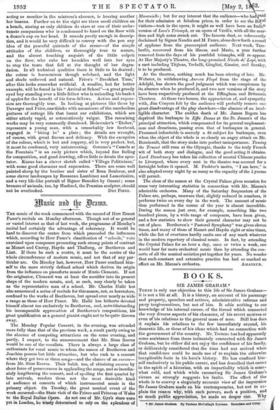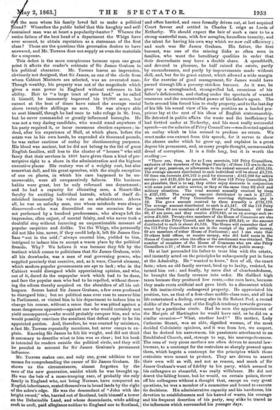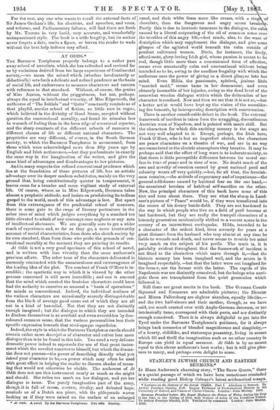BOOKS.
SIR JAMES GRAHAM.*
THERE is only one objection to this life of Sir James Graham— it is not a life at all. It is a history, an account of his parentage and property, speeches and actions, administrative reforms and party tergiversations, but not of him. It adds nothing to our knowledge of his internal career, of the thread which connected the very diverse aspects of his character, of his secret motives or even of his relations to the general mass of men. Still less does it explain his relations to the few immediately around, his domestic life, or those of his ideas which had no connection with the government of the country. Mr. Torrens has had apparently some assistance from those intimately connected with Sir James Graham, but he either did not enjoy the confidence of his family, or deliberately considered that the time had not arrived when that confidence could be made use of to explain the otherwise inexplicable facts in his hero's history. He has confined him- self exclusively to his public career, and has described that career in the spirit of a historian, with an impartiality which is some- what cold, and which while recounting Sir James Graham's virtues as strongly suggests his faults. The effect of the whole is to convey a singularly accurate view of the impression Sir James Graham made on his contemporaries, but not to ex- plain the reason why, with such powers, such a position, and so much public appreciation, he made uo deeper one. Why
* Sir James Graham. By Torrens Weasel Terms. Saunders and 0Say.
di the man whom his family loved fail to make a political riend? Wherefore the public belief that this haughty and self- contained man was at heart a popularity-bunter ? Whence the entire failure of the best head of a department the Whigs have ever secured, to obtain reputation as a statesman of the first class ? These are the questions this generation desires to have answered, and Mr. Torrens does not supply us even the materials for a response.
This defect is the more conspicuous because upon one great point it affects the reader's estimate of Sir James Graham in
his political character. Mr. Torrens leaves an impression, obviously not designed, that Sir James, as one of the circle from whom Cabinet Ministers are selected, was an overrated man. Though wealthy, his property was not of the magnitude which gives a man power in England without reference to his ability. Heir to " a large tract of poor land," as he called it himself, he immensely improved his 18,000 acres, but cannot at the best of times have raised the average rental above twenty-five shillings an acre. He was always able to seat himself, though he had once to take refuge in St. Ives, but he never commanded or greatly influenced boroughs. He was not a very daring candidate, who would stand anywhere if his party required it, or incur enormous election expenses ; in- deed, after his experience of Hull, at which place, before the estate was in his own hands, he expended six thousand pounds, he was rather cautious of outlay for electioneering purposes. His blood was ancient, but he did not belong to the fist of great English families, still less to the cluster of " houses " who still fancy that their services in 1688 have given them a kind of pre- scriptive right to a share in the administration and the highest executive places. His oratory was of a weighty cast, but also somewhat dull, and his great speeches, with the single exception of one on places, in which his case happened to be un- answerable, were all comparatively failures. His business habits were great, but he only reformed one department ; and he had a capacity for alienating men, a Stuart-like faculty for exciting individual hatreds, which of itself di- minished immensely his value as an administrator. Above all, lie was an unlucky man, one whose misdeeds were always discovered—who was discredited on one occasion for an act performed by a hundred predecessors, who always left the impression, often unjust, of mental falsity, and who never took a doubtful step without incurring an unquestionable measure of popular suspicion and dislike. Yet the Whigs, who personally did not like him, never, if they could help it, left Sir James Gra- tam "out in the cold;" always courted him, yielded to him, intrigued to induce him to accept a warm place by the political fireside. Why ? We believe it was because they felt by the instinct which comes to politicians that Sir James Graham, with all his drawbacks, was a man of real governing power, who supplied precisely that coercive, and, as it were, Czarish element, which modern popular governments are apt to lack ; who in the Cabinet would disregard while appreciating opinion, and who, out of it, dared do the unpopular work which bad to be done, and face the popular men who had to be repelled, without throw- ing the odium thereby acquired on the shoulders of all his col- leagues. Scores hated Sir James Graham, a few even professed to disregard him ; but no political man ever rose to answer him in Parliament, or visited him in his department to induce him to change his course, without a sense that he was pitted against a most dangerous opponent—against one who would certainly not yield unconquered,—who would probably conquer him, and who would possibly convince the assailant that defeat ought to be his appointed portion. And, therefore, he was courted by ministers, a fact Mr. Torrens repeatedly mentions, but never essays to ex- plain. Knowing Sir James he felt his weight, and did not think it necessary to describe what to him was so clear ; but his book is intended for readers outside the political circle, and they will be puzzled to account for Sir James Graham's permanent influence.
Mr. Torrens makes one, and only one, great addition to our means for comprehending the career of Sir James Graham. He shows us the circumstances, almost forgotten by the men of the new generation, amidst which he was brought up. He was the heir of a moss-trooping race, of probably the only family in England who, not being Norman, have conquered an English inheritance, seated themselves in broad lands by the right of the sabre's edge. He was the descendant of "John with the bright sword," who, harried out of Scotland, built himself a tower on the Debateable Land, and whose descendants, while adding croft to croft, paid allegiance neither to England nor to Scotland,
and often harried, and once formally driven out, at last acquired Court favour and settled in Charles I. reign as Lords of Netherby. We should expect the heir of such a race to be a strong masterful man, with few scruples, boundless tenacity, and the talent for having his own way which we now call efficiency ; and such was Sir James Graham. His father, the first baronet, was one of the missing links so often seen in families, who want the hereditary qualities in order that their descendants may have a double share. A spendthrift, and devoted to pleasure, he half ruined the estate, partly by encumbrances, and partly by improvements made without skill, and, but for its great extent, which allowed a wide margin for the exercise of good management, Sir James would have passed through life a poverty-stricken baronet. As it was, he grew up a strongheaded, strongwilled lad, conscious of his father's deficiencies, and chafing under the spectacle of wasted resources and the uncontrolled power of his father's agent. The facts around him forced him to study property, and to the last day of his life his sound view of his own position as a landed pro- prietor lay at the root of his ideas of English statesmanship. He detested in public affairs the waste and the inefficiency he had fretted under at Netherby, and his most really successful speech—on the salaries of Privy Councilors—was directed against an outlay which to him seemed to produce no return. We must make one extract from this speech, for it serves to show the abuses under which he grew up, and explains in a great degree his permanent, and, as many people thought, unreasonable dread of corruption. It is a little long, but it is worth the
reading :-
" There are, then, as far as I can ascertain, 169 Privy Councillors, exclusive of the members of the Royal Family ; of these 113 are in the re- ceipt of pay, pensions or allowances to the annual amount of £650,164. The average amount distributed to each individual will be about £5,753. Of these emoluments £86,103 is paid for sinecures ; £442,000 for active service ; and £121,650 for pensions. Of these 113 Privy Councillors, 30 are pluralists, that is to say, they either enjoy sinecures in conjunction with some post of active service, or they at the same time fill civil and military situations. The total amount annually received by them is £221,130. The average amount distributed to each is £7,371. The number of Privy Councillors receiving diplomatic pay is 29. The gross amount received by them annually is £126,176. The average amount distributed to each is £4,347. Of the 113 Privy Councillors 69 are members of either House of Parliament. Of these 69, 47 are peers, and they receive £378,840, or on an average each re- ceives £8,069. Twenty-two members of the House of Commons are also members of the Privy Council, and they receive £98.849, or the amount distributed to each is about £4,130. The House will remember that of the 113 Privy Councillors who are in the receipt of the public money, 69 are members of either House of Parliament ; and I can state that 29 others hold offices, or receive money, who did hold seats in the House of Commons when the office or the emolument was obtained. The number of members of the House of Commons who are also Privy Councillors is 31 ; of these 22 are in the receipt of the public money.
He at last persuaded his father to trust him with the estate, and instantly acted on the principles he subsequently put in force at the Admiralty. He " wanted to know," first of all, the exact facts; when an old family servant, bred up to laxity, resisted, he turned him out ; and finally, by mere dint of clearheadedness, he brought the family revenue into order. He disliked high taxes because they produced low rents,—the corn laws, because they made rents artificial and gave birth to a discontent which he felt instinctively endangered property. He appreciated his position, too, as that of a first-class middle-class man, and all his life entertained a feeling, strong also in Sir Robert Peel, a rooted dislike of the Peers, and of the English tendency towards govern- ment by a particular circle. Had he seen the appointment of the Marquis of Hartington he would have said, as he did on a similar occasion—" What, another lord !" His mother, Lady Catherine Stuart, was an able, dignified woman, of the most decided Calvinistic opinions, and it was from her, we suspect, that he derived his narrowness, his passionate attachment to an Established Church, and, strange to say, his unscrupulousness. The sons of very pious mothers are often driven to mental law- lessness, to a contempt for the restraints so sharply pressed upon them, which begets a contempt for the principles which those restraints were meant to protect. They are driven to assert their own will as will, and not as reason, and much of Sir James Graham's want of fidelity to his party, which seemed to his colleagues so shameful, a as really wilfulness. He did not desert the falling house, but he would, on certain points, throw off his colleagues without a thought that, except on very great questions, he was a member of a committee and bound to execute its decisions. His administrative capacity and his harshness, his devotion to establishments and his hatred of waste, his courage and his frequent desertion of his party, may alike be traced to the influences which surrounded his younger days.
For the rest, any one who wants to recall the external factS of Sir James Graham's life, his elections, and speeches, and votes, and reforms, and Parliamentary failures, will find them set forth by Mr. Torrens in very lucid, very accurate, and wonderfully unimpassioned style. The book is a trifle lengthy, but its author never forgets a date, omits a figure, or leaves the reader to wade without the best help indexes may afford.
































 Previous page
Previous page